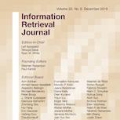Ranked search results and recommendations have become the main mechanism by which we find content, products, places, and people online. With hiring, selecting, purchasing, and dating being increasingly mediated by algorithms, rankings may determine career and business opportunities, educational placement, access to benefits, and even social and reproductive success. It is therefore of societal and ethical importance to ask whether search results can demote, marginalize, or exclude individuals of unprivileged groups or promote products with undesired features. In this paper we present FairSearch, the first fair open source search API to provide fairness notions in ranked search results. We implement two algorithms from the fair ranking literature, namely FA*IR (Zehlike et al., 2017) and DELTR (Zehlike and Castillo, 2018) and provide them as stand-alone libraries in Python and Java. Additionally we implement interfaces to Elasticsearch for both algorithms, that use the aforementioned Java libraries and are then provided as Elasticsearch plugins. Elasticsearch is a well-known search engine API based on Apache Lucene. With our plugins we enable search engine developers who wish to ensure fair search results of different styles to easily integrate DELTR and FA*IR into their existing Elasticsearch environment.
翻译:在网上找到内容、产品、地点和人的主要机制是搜索结果和建议。随着招聘、选择、购买和约会日益受到算法的调节,排名可能会决定职业和商业机会、教育安置、获得福利,甚至社会和生殖成功。因此,询问搜索结果能否演示、边缘化或排除没有特权的群体的个人或推广具有不理想特征的产品,具有社会和伦理重要性。在本文中,我们介绍了FairSearch,这是第一个在排名搜索结果中提供公平概念的公平性源搜索API。我们实施了两个来自公平排名文献的算法,即FA*IR(Zehlish等人,2017年)和DELTR(Zehlish and Castillo,2018年),并将其作为Python和Java的独立图书馆提供。此外,我们为上述爪哇图书馆的两位算法进行ElasticSearch搜索,然后作为精英搜索插件提供。ElasticSearch是一个著名的搜索引擎,以Appear Luene为基础,以Acie Lustene为主。我们用插件可以轻松地搜索引擎搜索现有的搜索结果。我们可以将El-TR 。





